Fleurs du Mal Magazine


Or see the index
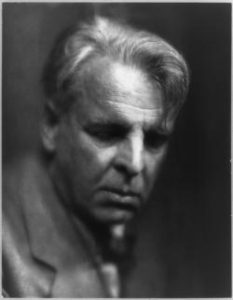
When Helen lived
We have cried in our despair
That men desert,
For some trivial affair
Or noisy, insolent sport,
Beauty that we have won
From bitterest hours;
Yet we, had we walked within
Those topless towers
Where Helen walked with her boy,
Had given but as the rest
Of the men and women of Troy,
A word and a jest.
William Butler Yeats
(1865-1939)
When Helen lived
• fleursdumal.nl magazine
More in: Archive Y-Z, Archive Y-Z, Yeats, William Butler
The poems in Mirabilia test the relationship between art and politics.
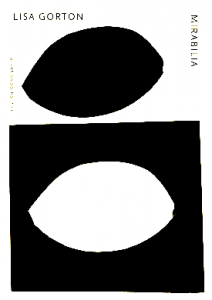 They are ekphrastic poems complicated by historical narrative; or, they are political poems, inspired by artworks. The title poem is a tribute to the pangolin, the world’s most-trafficked mammal – implicated, some say, in the evolution of coronavirus.
They are ekphrastic poems complicated by historical narrative; or, they are political poems, inspired by artworks. The title poem is a tribute to the pangolin, the world’s most-trafficked mammal – implicated, some say, in the evolution of coronavirus.
Written in Fibonacci syllabics, it is also a reflection on Marianne Moore’s poem ‘The Pangolin’, with its sense of nature’s perpetuity – lost in the years since her poem was written. The final sequence ‘Great World Atlas’ tracks the destructive extent of nuclear testing across the world in the 1960s. It was written for Izabela Pluta’s artist’s book Figures of Slippage and Oscillation.
The sequence ‘Tongue’ reflects on da Vinci’s 1478 painting The Benois Madonna, including the circumstances of its creation in the Pazzi conspiracy and the life of Fioretta del Cittadino – perhaps the painting’s model – who gave birth to the child of the murdered man.
Her child was taken; she was written out of the record. In other poems too, Gorton reflects on the experience of the female muse, wife, or mother.
Shortlisted: NSW Premier’s Literary Awards – Poetry 2023
Lisa Gorton has a PhD on the poetry of John Donne from the University of Oxford. She is a poet and novelist, essayist and reviewer. Her first poetry collection Press Release won the Victorian Premier’s Literary Award for Poetry; her second, Hotel Hyperion was awarded the Philip Hodgins Memorial Medal; and her third, Empirical, was shortlisted for the Prime Minister’s and NSW Premier’s Literary Awards for Poetry. Her novel The Life of Houses was the co-winner of the 2016 Prime Minister’s Literary Award for Fiction. She is the author of Cloudland, a novel for children.
Mirabilia
Poetry
by Lisa Gorton
Publisher: Giramondo Publishing (1 August 2022)
Language: English
Paperback: 96 pages
ISBN-10: 1922725307
ISBN-13: 978-1922725301
Dimensions: 20 x 14 x 1.5 cm
Price: aus. $ 25.00
• fleursdumal.nl magazine
More in: #Editors Choice Archiv, - Book News, - Bookstores, Archive G-H, Archive G-H
In mei 1940 is de dichter Gerrit Kouwenaar (1923-2014) zestien jaar en schrijft hij zijn eerste gedichten.
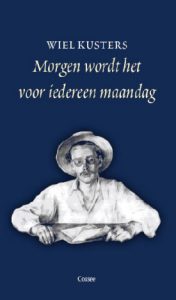 Zes jaar later en een wereldoorlog verder is hij, zonder dat nog te beseffen, op weg om een van de meest invloedrijke Vijftigers te worden.
Zes jaar later en een wereldoorlog verder is hij, zonder dat nog te beseffen, op weg om een van de meest invloedrijke Vijftigers te worden.
De Tweede Wereldoorlog, die grote ontvormer van mens en moraal, heeft hem gemaakt tot de dichter die later liever ‘men’ dan ‘ik’ schreef en die, tot zijn dood in 2014, is uitgegroeid tot een van de grootste Nederlandse dichters van de twintigste eeuw.
In zijn dankwoord bij de uitreiking van de Prijs der Nederlandse Letteren in 1989 in Brussel sprak hij over de jaren 1940-1945 als een ‘leerschool die mij heeft bijgebracht dat woorden lege hulzen zijn als ze niet gevuld worden met je eigen leven en lichaam, je eigen sterfelijkheid.’
Morgen is het voor iedereen maandag belicht op uiterst boeiende wijze de periode van de bezetting en de eerste jaren na de oorlog, wanneer de dichter als kunstredacteur in dienst is van het communistische dagblad De Waarheid. Het verhaal is doorspekt met tal van niet eerder gepubliceerde gedichten, verhaal- en brieffragmenten.
Morgen wordt het voor iedereen maandag
De oorlog van Gerrit Kouwenaar
door Wiel Kusters
Taal: NL
Cossee
Mei 2023
ISBN: 9789464520767
Hardcover
450 pagina’s
€ 39,99
• fleursdumal.nl magazine
More in: - Book News, - Bookstores, Archive K-L, Archive K-L, Gerrit Kouwenaar, Kouwenaar, Gerrit, Wiel Kusters
From acclaimed independent journalist Kevin Gosztola, this carefully-documented analysis of the government’s case against Julian Assange and its implications for press freedom acts as a crucial, compelling guidebook to Assange’s upcoming trial.
Guilty of Journalism is a joint production of The Censored Press and Seven Stories Press.
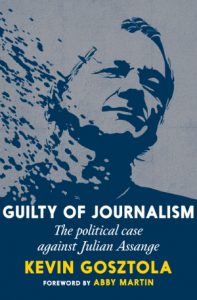 The legal action against Julian Assange is poised to culminate in a trial in the United States in 2023, and this book will help the public understand the proceedings. The establishment media’s coverage of WikiLeaks founder Julian Assange’s extradition case has focused on his deteriorating health and what CBS News called his “secret family,” but most of this coverage failed to detail the complex issues at stake against Assange.
The legal action against Julian Assange is poised to culminate in a trial in the United States in 2023, and this book will help the public understand the proceedings. The establishment media’s coverage of WikiLeaks founder Julian Assange’s extradition case has focused on his deteriorating health and what CBS News called his “secret family,” but most of this coverage failed to detail the complex issues at stake against Assange.
Guilty of Journalism outlines how WikiLeaks exposed the reality of American wars, the United States government’s unprecedented indictment against Assange as a publisher, and the media’s role in persuading the public to “shoot the messenger.”
This new book by Kevin Gosztola, who has spent the last decade covering Assange, WikiLeaks, and the wider war on whistleblowers, tells the full story based on testimony from dozens of witnesses. It examines abuses of power by the CIA and the FBI, including a spying operation that targeted Assange’s family, lawyers, and doctors. Guilty of Journalism offers a balanced and comprehensive perspective on all the events leading up to what press freedom advocates have called the trial of the century.
Kevin Gosztola has spent the last decade reporting on Assange, WikiLeaks, and the wider war on whistleblowers. He is cofounder and managing editor of Shadowproof, an independent news outlet focused on systemic abuses of power in business and government, and the curator of The Dissenter newsletter. Gosztola also produces and co-hosts the weekly podcast, “Unauthorized Disclosure.” His work has appeared in outlets such as The Nation, Salon, Common Dreams, and Truthout, and he has been a featured guest on Democracy Now!, The Real News Network, CounterSpin, and Al Jazeera English. He is coauthor of Truth and Consequences: The US vs. Bradley Manning (Sinclair Books, 2012; with Greg Mitchell).
Guilty of Journalism
The Political Case Against Julian Assange
by Kevin Gosztola
Foreword by Abby Martin
Seven Stories Press
Paperback
Publish Date: 07-03-2023
ISBN: 9781644212721
Pages: 256
$16.95
• fleursdumal.nl magazine
More in: - Book News, - Bookstores, Archive G-H, AUDIO, CINEMA, RADIO & TV, MUSEUM OF PUBLIC PROTEST, REPRESSION OF WRITERS, JOURNALISTS & ARTISTS
In Customs, Solmaz Sharif examines what it means to exist in the nowhere of the arrivals terminal, a continual series of checkpoints, officers, searches, and questionings that become a relentless experience of America.
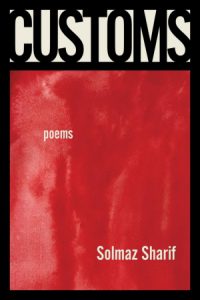 With resignation and austerity, these poems trace a pointed indoctrination to the customs of the nation-state and the English language, and the realities they impose upon the imagination, the paces they put us through.
With resignation and austerity, these poems trace a pointed indoctrination to the customs of the nation-state and the English language, and the realities they impose upon the imagination, the paces they put us through.
While Sharif critiques the culture of performed social skills and poetry itself—its foreclosures, affects, successes—she begins to write her way out to the other side of acceptability and toward freedom.
Customs is a brilliant, excoriating new collection by a poet whose unfolding works are among the groundbreaking literature of our time.
This will be the last I write of it directly, I say each time.
This is a light that lights everything and dimly.
All my waiting at this railing.
All my writing is this squint.
Solmaz Sharif is the author of a Customs and Look, which was a finalist for the National Book Award and a New York Times Notable Book. She has received a Rona Jaffe Foundation Writers’ award, a Lannan Literary Fellowship, and fellowships from the National Endowment for the Arts and the Poetry Foundation. Her poetry has appeared in Granta, the New Republic, and Poetry. She is currently the Shirley Shenker Assistant Professor of English at U.C. Berkeley. ( https://solmazsharif.com/ )
Customs: Poems
by Solmaz Sharif
86 pages
Paperback
Publisher: Graywolf Press
March 1, 2022
Language: English
Paperback: 72 pages
ISBN-10:1644450798
ISBN-13:978-1644450796
$15.99
• fleursdumal.nl magazine
More in: #Editors Choice Archiv, Archive S-T, Archive S-T
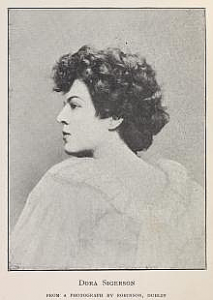
The Dead Soldier
(In memory of Thomas Ashe)
Where the sword has opened the way the man will follow
“Look! they came, the triumphant army!
Over yon hill see their weapons peeping!”
Still I spoke not but my wheel sent turning,
I closed my eyes for my heart was weeping,
My heart was weeping for a dead soldier.
Who is he who looks towards me ?
“’Tis no man but a gay flag flying,”
Red was his mouth and his white brow thoughtful,
Blue his eyes — how my soul is crying,
My soul is crying for a dead soldier.
“Kneel ye down, lest your eyes should dare them,
Kneel ye down and your beads be saying.”
“Lord, on their heads Thy wrath deliver,”
This is the prayer that my lips are praying,
My heart is praying for a dead soldier.
“Best cheer the path of the men victorious,
For he is dead and his blade lies broken,
His march is far where no aid can follow,
And for his people he left no token,
He left no token, the dead soldier.”
The way of the sword a man can follow,
See the young child with his gold hair gleaming.
When falls the oak must the acorn perish?
He lifts the blade and his eyes are dreaming,
He dreams the dream of the dead soldier.
THE END
Dora Maria Sigerson Shorter
(1866 – 1918)
The Dead Soldier
(In memory of Thomas Ashe)
• fleursdumal.nl magazine
More in: Archive S-T, Archive S-T, Sigerson Shorter, Dora Maria, WAR & PEACE

Der Kuss
Du kamst des Wegs, durch den ich viel gelitten,
Du kamst, dem viel ich habe abzubitten,
Du Freund, du Feind, der über meinen Schritten
Einst herrschend hielt den Stab.
War’s Tag, war’s Traum? Die Stadt lag fremd im Lichte,
Von Wind durchbellt. Du schwanktest ohne Richte.
So blind! So grau! Ich las dir vom Gesichte
Das Grab, das fahle Grab.
Den ich vor wenig Wochen hier verlassen
Auf diesen Plätzen und in diesen Gassen,
Das war der Mann nicht mehr, stark und gelassen,
Den jetzt ich wankend traf.
Du sprachst zu mir. Ich hörte Worte fallen,
Sie schollen traurig und wie hohles Hallen.
Nicht Worte waren das, es war das Lallen,
Das trunkne, vor dem Schlaf.
In Weh und Scham von dir ich wollte weichen.
Du hobst die Hand, sie still mir herzureichen.
Da faßte mich ein Abschied ohnegleichen,
Daß Scham und Weh zerrann,
Und was sich niemals zwischen uns begeben:
Ein tiefer Kuß vereinte unser Leben,
Den noch kein Weib empfing, ein Kuß, so bebend,
Der Kuß von Mann zu Mann.
Nun kann ich nicht die Tür des Wachens finden.
Ich will den Traum des Kusses überwinden,
Verbergen mich, im Menschentag verschwinden,
Doch das Geheimnis brennt.
Ich fühl mich sprechen, lachen, schreiben, kramen.
Mein Herz ist schwarz geschluchzt, ach, und der Samen
Der fremden Liebe wächst, die keinen Namen
Und kein Geständnis kennt.
Franz Werfel
(1890 – 1945)
Der Kuss
• fleursdumal.nl magazine
More in: Archive W-X, Archive W-X, Werfel, Franz
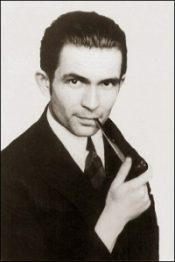
Melopee
Voor Gaston Burssens
Onder de maan schuift de lange rivier
Over de lange rivier schuift moede de maan
Onder de maan op de lange rivier schuift de kano naar zee
Langs het hoogriet
langs de laagwei
schuift de kano naar zee
schuift met de schuivende maan de kano naar zee
Zo zijn ze gezellen naar zee de kano de maan en de man
Waarom schuiven de maan en de man getweeën gedwee naar de zee
.
Paul van Ostaijen
(1896 – 1928)
Melopee
• fleursdumal.nl magazine
More in: Archive O-P, Archive O-P, Expressionism, Expressionisme, Ostaijen, Paul van, Paul van Ostaijen, Paul van Ostaijen
In the poem-essays that comprise A Duration, writing is a physical act where writing and lived experience support one another in bodies—animal, plant, mineral, and word bodies—that are injured and heal, that die and continue in new forms, playing new roles.
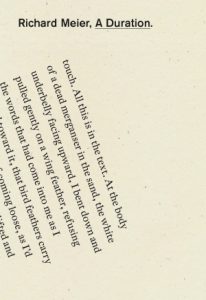 Here, in his fifth book, Richard Meier transmutes years of daily practices of attention—be it to a line spoken by Lear’s Fool, a train to Kingston, or “red inside green stem below eight white petals in a spiral with space between them attached to the yellow center”—into mesmerizing trajectories through an always unfolding present.
Here, in his fifth book, Richard Meier transmutes years of daily practices of attention—be it to a line spoken by Lear’s Fool, a train to Kingston, or “red inside green stem below eight white petals in a spiral with space between them attached to the yellow center”—into mesmerizing trajectories through an always unfolding present.
In the collapse of the border between writing and the body, A Duration, “play[s] both hearts with a heartbeat and kinship of place, time, mundanity in the continuous onrushing imagined joy.”
Richard Meier’s second book of poetry, Shelley Gave Jane a Guitar, was published by Wave Books in 2006. His first book, Terrain Vague, was selected by Tomaž Šalamun for the Verse Prize and published by Verse Press in 2001. His book In the Pure Block of the Whole Imaginary was published by Omnidawn in 2012. He is writer-in-residence at Carthage College and lives in Chicago, IL and Madison, WI.
Richard Meier
A Duration
Publication: 6 June 2023
Publisher: Wave Books
Language: Engish
Paperback: 120 pages
ISBN-10:1950268780
ISBN-13:978-1950268788
Regular price $18.00
• fleursdumal.nl magazine
More in: #Editors Choice Archiv, - Book Lovers, - Book News, - Bookstores, Archive M-N, Archive M-N

Tod im Frühling
Ein Professor, fromm und tugendhaft,
war exorbitant normal im Winter;
zur Erhaltung deutscher Manneskraft
schlief er stets mit einem Werk von Dinter;
morgens steckte er ins Stahlbad Glied um Glied,
trieb am Reck dann Weltkriegsvorbereitung,
und, fürs arisch-reine Vaterland erglüht,
abonnierte er die »Deutsche Zeitung«.
Also lebte er zur Winterszeit. –
Doch beim ersten Lied der Nachtigallen
machte er sein Teleskop bereit,
um des Nachts durch das Gebüsch zu wallen;
Minne glühte auch in seiner Brust,
wenn er eine Wade wo erblickte;
und es war sein Wille groß wie seine Lust – –
nur, daß letztere ihm niemals glückte.
Mit der Blendlaterne spähte er
nach den unverschämten Gartenbänken,
zu den deutschen Göttern flehte er,
dieses Mobiliar der Juden zu versenken;
aber Unzucht blieb, kein Rächer kam,
und vergebens betete der Keusche,
während er, moral-geplagt, vernahm
außereheliche Nachtgeräusche.
Bald begannen Nase, Aug’ und Ohr
und der sechste Sinn sich auch zu schämen – –
außer sich geriet der Professor,
und er mußte endlich Anstoß nehmen;
unter einem weißen Fliederstrauch
tat er’s, ward erregt – und fand sein Ende . . .
Streng und sittlich flog sein letzter Hauch
wie ein keuscher Fluch durch das Gelände . . .
Joseph Roth
(1894 – 1939)
Tod im Frühling
Lachen links – 9. 5· 1924
• fleursdumal.nl magazine
More in: Archive Q-R, Archive Q-R, Joseph Roth, Natural history

Sometimes In The Middle Autumn Days
Sometimes in the middle autumn days,
The windless days when the swallows have flown,
And the sere elms brood in the mist,
Each tree a being, rapt, alone,
I know, not as in barren thought,
But wordlessly, as the bones know,
What quenching of my brain, what numbness,
Wait in the dark grave where I go.
And I see the people thronging the street,
The death-marked people, they and I
Goalless, rootless, like leaves drifting,
Blind to the earth and to the sky;
Nothing believing, nothing loving,
Not in joy nor in pain, not heeding the stream
Of precious life that flows within us,
But fighting, toiling as in a dream.
O you who pass, halt and remember
What tyrant holds your life in bond;
Remember the fixed, reprieveless hour,
The crushing stroke, the dark beyond.
And let us now, as men condemned,
In peace and thrift of time stand still
To learn our world while yet we may,
And shape our souls, however ill;
And we will live, hand, eye and brain,
Piously, outwardly, ever-aware,
Till all our hours burn clear and brave
Like candle flames in windless air;
So shall we in the rout of life
Some thought, some faith, some meaning save,
And speak it once before we go
In silence to the silent grave.
George Orwell
(1903 – 1950)
Sometimes In The Middle Autumn Days
First published by The Adelphi, March 1933
• fleursdumal.nl magazine
More in: 4SEASONS#Autumn, Archive O-P, Archive O-P, George Orwell, Orwell, George

Voyages
I
Above the fresh ruffles of the surf
Bright striped urchins flay each other with sand.
They have contrived a conquest for shell shucks,
And their fingers crumble fragments of baked weed
Gaily digging and scattering.
And in answer to their treble interjections
The sun beats lightning on the waves,
The waves fold thunder on the sand;
And could they hear me I would tell them:
O brilliant kids, frisk with your dog,
Fondle your shells and sticks, bleached
By time and the elements; but there is a line
You must not cross nor ever trust beyond it
Spry cordage of your bodies to caresses
Too lichen-faithful from too wide a breast.
The bottom of the sea is cruel.
II
–And yet this great wink of eternity,
Of rimless floods, unfettered leewardings,
Samite sheeted and processioned where
Her undinal vast belly moonward bends,
Laughing the wrapt inflections of our love;
Take this Sea, whose diapason knells
On scrolls of silver snowy sentences,
The sceptred terror of whose sessions rends
As her demeanors motion well or ill,
All but the pieties of lovers’ hands.
And onward, as bells off San Salvador
Salute the crocus lustres of the stars,
In these poinsettia meadows of her tides,–
Adagios of islands, O my Prodigal,
Complete the dark confessions her veins spell.
Mark how her turning shoulders wind the hours,
And hasten while her penniless rich palms
Pass superscription of bent foam and wave,–
Hasten, while they are true,–sleep, death, desire,
Close round one instant in one floating flower.
Bind us in time, O Seasons clear, and awe.
O minstrel galleons of Carib fire,
Bequeath us to no earthly shore until
Is answered in the vortex of our grave
The seal’s wide spindrift gaze toward paradise.
III
Infinite consanguinity it bears–
This tendered theme of you that light
Retrieves from sea plains where the sky
Resigns a breast that every wave enthrones;
While ribboned water lanes I wind
Are laved and scattered with no stroke
Wide from your side, whereto this hour
The sea lifts, also, reliquary hands.
And so, admitted through black swollen gates
That must arrest all distance otherwise,–
Past whirling pillars and lithe pediments,
Light wrestling there incessantly with light,
Star kissing star through wave on wave unto
Your body rocking!
and where death, if shed,
Presumes no carnage, but this single change,–
Upon the steep floor flung from dawn to dawn
The silken skilled transmemberment of song;
Permit me voyage, love, into your hands …
IV
Whose counted smile of hours and days, suppose
I know as spectrum of the sea and pledge
Vastly now parting gulf on gulf of wings
Whose circles bridge, I know,
(from palms to the severe
Chilled albatross’s white immutability)
No stream of greater love advancing now
Than, singing, this mortality alone
Through clay aflow immortally to you.
All fragrance irrefragably, and claim
Madly meeting logically in this hour
And region that is ours to wreathe again,
Portending eyes and lips and making told
The chancel port and portion of our June–
Shall they not stem and close in our own steps
Bright staves of flowers and quills today as I
Must first be lost in fatal tides to tell?
In signature of the incarnate word
The harbor shoulders to resign in mingling
Mutual blood, transpiring as foreknown
And widening noon within your breast for gathering
All bright insinuations that my years have caught
For islands where must lead inviolably
Blue latitudes and levels of your eyes,–
In this expectant, still exclaim receive
The secret oar and petals of all love.
V
Meticulous, past midnight in clear rime,
Infrangible and lonely, smooth as though cast
Together in one merciless white blade–
The bay estuaries fleck the hard sky limits.
–As if too brittle or too clear to touch!
The cables of our sleep so swiftly filed,
Already hang, shred ends from remembered stars.
One frozen trackless smile … What words
Can strangle this deaf moonlight? For we
Are overtaken. Now no cry, no sword
Can fasten or deflect this tidal wedge,
Slow tyranny of moonlight, moonlight loved
And changed … “There’s
Nothing like this in the world,” you say,
Knowing I cannot touch your hand and look
Too, into that godless cleft of sky
Where nothing turns but dead sands flashing.
“–And never to quite understand!” No,
In all the argosy of your bright hair I dreamed
Nothing so flagless as this piracy.
But now
Draw in your head, alone and too tall here.
Your eyes already in the slant of drifting foam;
Your breath sealed by the ghosts I do not know:
Draw in your head and sleep the long way home.
VI
Where icy and bright dungeons lift
Of swimmers their lost morning eyes,
And ocean rivers, churning, shift
Green borders under stranger skies,
Steadily as a shell secretes
Its beating leagues of monotone,
Or as many waters trough the sun’s
Red kelson past the cape’s wet stone;
O rivers mingling toward the sky
And harbor of the phoenix’ breast–
My eyes pressed black against the prow,
–Thy derelict and blinded guest
Waiting, afire, what name, unspoke,
I cannot claim: let thy waves rear
More savage than the death of kings,
Some splintered garland for the seer.
Beyond siroccos harvesting
The solstice thunders, crept away,
Like a cliff swinging or a sail
Flung into April’s inmost day–
Creation’s blithe and petalled word
To the lounged goddess when she rose
Conceding dialogue with eyes
That smile unsearchable repose–
Still fervid covenant, Belle Isle,
–Unfolded floating dais before
Which rainbows twine continual hair–
Belle Isle, white echo of the oar!
The imaged Word, it is, that holds
Hushed willows anchored in its glow.
It is the unbetrayable reply
Whose accent no farewell can know.
Hart Crane
(1889 – 1932)
Voyages
• fleursdumal.nl magazine
More in: Archive C-D, Archive C-D, Crane, Hart
Thank you for reading Fleurs du Mal - magazine for art & literature